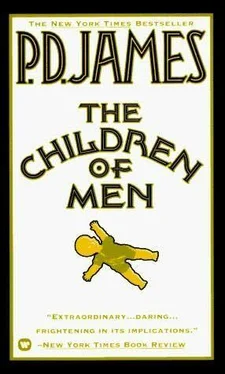It happened on the fourth Wednesday in January. Walking to Magdalen as was his custom, he had turned from St. John Street into Beaumont Street and was nearing the entrance to the Ashmolean Museum when a woman approached him wheeling a pram. The thin drizzle had stopped and as she drew alongside him she paused to fold back the mackintosh cover and push down the pram hood. The doll was revealed, propped upright against the cushions, the two arms, hands mittened, resting on the quilted coverlet, a parody of childhood, at once pathetic and sinister. Shocked and repelled, Theo found that he couldn’t keep his eyes off it. The glossy irises, unnaturally large, bluer than those of any human eye, a gleaming azure, seemed to fix on him their unseeing stare which yet horribly suggested a dormant intelligence, alien and monstrous. The eyelashes, dark brown, lay like spiders on the delicately tinted porcelain cheeks and an adult abundance of yellow crimped hair sprung from beneath the close-fitting lace-trimmed bonnet.
It had been years since he had last seen a doll thus paraded, but they had been common twenty years ago, had indeed become something of a craze. Doll-making was the only section of the toy industry which, with the production of prams, had for a decade flourished; it had produced dolls for the whole range of frustrated maternal desire, some cheap and tawdry but some of remarkable craftsmanship and beauty which, but for the Omega which originated them, could have become cherished heirlooms. The more expensive ones—some he remembered costing well over £2,000—could be bought in different sizes: the newborn, the six-month-old baby, the year-old, the eighteen-month-old child able to stand and walk, intricately powered. He remembered now that they were called Six-Monthlies. At one time it wasn’t possible to walk down the High Street without being encumbered by their prams, by groups of admiring quasi-mothers. He seemed to remember that there had even been pseudo-births and that broken dolls were buried with ceremony in consecrated ground. Wasn’t it one of the minor ecclesiastical disputes of the early 2000s whether churches could legitimately be used for these charades and even whether ordained priests could take part?
Aware of his gaze, the woman smiled, an idiot smile, inviting connivance, congratulations. As their eyes met and he dropped his, so that she shouldn’t see his small pity and his greater contempt, she jerked the pram back, then put out a shielding arm as if to ward off his masculine importunities. A more responsive passer-by stopped and spoke to her. A middle-aged woman in well-fitting tweeds, hair carefully groomed, came up to the pram, smiled at the doll’s owner and began a congratulatory patter. The first woman, simpering with pleasure, leaned forward, smoothed the satin quilted pram cover, adjusted the bonnet, tucked in a stray lock of hair. The second tickled the doll beneath its chin as she might a cat, still murmuring her baby talk.
Theo, more depressed and disgusted by the charade than surely such harmless play-acting justified, was turning away when it happened. The second woman suddenly seized the doll, tore it from the coverings and, without a word, swung it twice round her head by the legs and dashed it against the stone wall with tremendous force. The face shattered and shards of porcelain fell tinkling to the pavement. The owner was for two seconds absolutely silent. And then she screamed. The sound was horrible, the scream of the tortured, the bereaved, a terrified, high-pitched squealing, inhuman yet all too human, unstoppable. She stood there, hat askew, head thrown back to the heavens, her mouth stretched into a gape from which poured her agony, her grief, her anger. She seemed at first unaware that the attacker still stood there, watching her with silent contempt. Then the woman turned and walked briskly through the open gates, across the courtyard and into the Ashmolean. Suddenly aware that the attacker had escaped, the doll-owner galumphed after her, still screaming, then, apparently realizing the hopelessness of it, returned to the pram. She had grown quieter now and, sinking to her knees, began gathering up the broken pieces, sobbing and moaning gently, trying to match them as she might a jigsaw puzzle. Two gleaming eyes, horribly real, joined by a spring, rolled towards Theo. He had a second’s impulse to pick them up, to help, to speak at least a few words of comfort. He could have pointed out that she could buy another child. It was a consolation he hadn’t been able to offer his wife. But his hesitation was only momentary. He walked briskly on. No one else went near her. Middle-aged women, those who had reached adulthood in the year of Omega, were notoriously unstable.
He reached the chapel just as the service was about to begin. The choir of eight men and eight women filed in, bringing with them a memory of earlier choirs, boy choristers entering grave-faced with that almost imperceptible childish swagger, crossed arms holding the service sheets to their narrow chests, their smooth faces lit as if with an internal candle, their hair brushed to gleaming caps, their faces preternaturally solemn above the starched collars. Theo banished the image, wondering why it was so persistent when he had never even cared for children. Now he fixed his eyes on the chaplain, remembering the incident some months previously when he had arrived early for Evensong. Somehow a young deer from the Magdalen meadow had made its way into the chapel and was standing peaceably beside the altar as if this were its natural habitat. The chaplain, harshly shouting, had rushed at it, seizing and hurling prayer books, thumping its silken sides. The animal, puzzled, docile, had for a moment endured the assault and then, delicate-footed, had pranced its way out of the chapel.
The chaplain had turned to Theo, tears streaming down his face. “Christ, why can’t they wait? Bloody animals. They’ll have it all soon enough. Why can’t they wait?”
As Theo looked now at his serious, self-important face it seemed, in this candle-lit peace, no more than a bizarre scene from a half-remembered nightmare.
The congregation, as usual, numbered fewer than thirty and many of those present, regulars like himself, were known to Theo. But there was one newcomer, a young woman, seated in the stall immediately opposite his own, whose gaze, from time to time, it was difficult to avoid although she gave no sign of recognition. The chapel was dimly lit and through the flicker of candles her face gleamed with a gentle, almost transparent light, at one moment seen clearly, then as elusive and insubstantial as a wraith. But it was not unknown to him; somehow he’d seen her before, not just with a momentary glance, but face to face and for a stretch of time. He tried to force and then trick his memory into recall, fixing his eyes on her bent head during the confession, appearing to stare past her with pious concentration during the reading of the first lesson, but constantly aware of her, casting over her image memory’s barbed net. By the end of the second lesson he was becoming irritated by his failure and then, as the choir, mostly middle-aged, arranged their music sheets and gazed at the conductor, waiting for the organ to begin and his small surpliced figure to raise his paw-like hands and begin their delicate paddling of the air, Theo remembered. She had been briefly a member of Colin Seabrook’s class on Victorian Life and Times, with its subtitle Women in the Victorian Novel, which he had taken for Colin eighteen months previously. Seabrook’s wife had had a cancer operation; there was a chance of a holiday together if Colin could find a substitute for this one four-session class. He could recall their conversation, his half-hearted protest.
“Shouldn’t you get a member of the English Faculty to do it for you?”
Читать дальше












